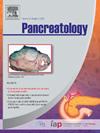Association between ABO blood groups and pancreatic cancer outcomes: A systematic review and meta-analysis
IF 2.7
2区 医学
Q2 GASTROENTEROLOGY & HEPATOLOGY
引用次数: 0
Abstract
Background/objectives
Although some studies report an increased overall survival for patients with pancreatic cancer and blood type O, others show no significant association. Therefore, we sought to perform a systematic review and meta-analysis to evaluate the association between ABO blood groups and the outcomes of patients with pancreatic cancer.
Methods
A systematic review of the literature was conducted using the PubMed/Medline, Cochrane Library, and Embase databases in April 2024. This review included observational studies that assessed pancreatic cancer outcomes regarding different ABO blood groups. The outcomes of interest included overall survival (OS), median survival time, tumor stage, lymph node metastasis, and distant metastasis.
Results
A total of 18 studies were included in this systematic review, encompassing 9084 patients. The mean age of patients was 62.6 ± 36.5 years old and the proportion of males was 58.8 % (n = 4177). Blood type O showed better OS than non-O in both unadjusted (HR 0.82; 95 % CI 0.75–0.91) and adjusted analyses (HR 0.76; 95 % CI 0.68–0.85). Blood type O patients were also less frequently diagnosed with advanced disease stages upon presentation (OR 0.82; 95 % CI 0.69–0.97). There were no statistically significant differences in either lymph node metastasis or distant metastasis.
Conclusions
Patients with blood type O exhibited better OS and were less frequently diagnosed with advanced cancer stages (III-IV) upon presentation compared to those with non-O blood types. Further research is needed to investigate the mechanisms underlying these associations.
ABO血型与胰腺癌预后之间的关系:一项系统综述和荟萃分析。
背景/目的:虽然一些研究报告了胰腺癌和O型血患者的总生存率增加,但其他研究显示没有显著相关性。因此,我们试图进行系统回顾和荟萃分析,以评估ABO血型与胰腺癌患者预后之间的关系。方法:于2024年4月使用PubMed/Medline、Cochrane Library和Embase数据库对文献进行系统综述。本综述纳入了评估不同ABO血型胰腺癌预后的观察性研究。研究结果包括总生存期(OS)、中位生存期、肿瘤分期、淋巴结转移和远处转移。结果:本系统综述共纳入18项研究,共9084例患者。患者平均年龄62.6±36.5岁,男性占58.8% (n = 4177)。O型血的OS优于非O型血(HR 0.82;95% CI 0.75-0.91)和校正分析(HR 0.76;95% ci 0.68-0.85)。O型血患者在就诊时被诊断为疾病晚期的频率也较低(OR 0.82;95% ci 0.69-0.97)。淋巴结转移和远处转移的差异无统计学意义。结论:与非O型血的患者相比,O型血的患者表现出更好的OS,并且在就诊时被诊断为晚期癌症(III-IV)的频率更低。需要进一步的研究来调查这些关联背后的机制。
本文章由计算机程序翻译,如有差异,请以英文原文为准。
求助全文
约1分钟内获得全文
求助全文
来源期刊

Pancreatology
医学-胃肠肝病学
CiteScore
7.20
自引率
5.60%
发文量
194
审稿时长
44 days
期刊介绍:
Pancreatology is the official journal of the International Association of Pancreatology (IAP), the European Pancreatic Club (EPC) and several national societies and study groups around the world. Dedicated to the understanding and treatment of exocrine as well as endocrine pancreatic disease, this multidisciplinary periodical publishes original basic, translational and clinical pancreatic research from a range of fields including gastroenterology, oncology, surgery, pharmacology, cellular and molecular biology as well as endocrinology, immunology and epidemiology. Readers can expect to gain new insights into pancreatic physiology and into the pathogenesis, diagnosis, therapeutic approaches and prognosis of pancreatic diseases. The journal features original articles, case reports, consensus guidelines and topical, cutting edge reviews, thus representing a source of valuable, novel information for clinical and basic researchers alike.
 求助内容:
求助内容: 应助结果提醒方式:
应助结果提醒方式:


